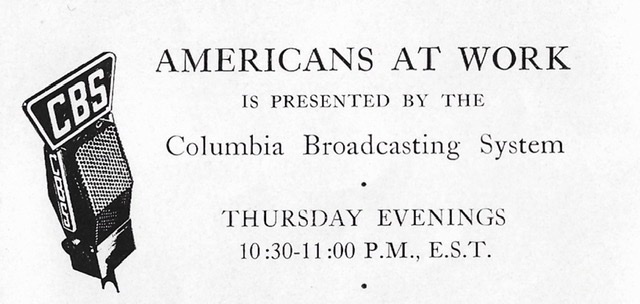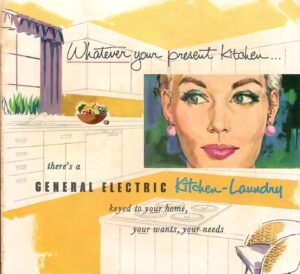Picking up where we left off a couple days ago, we continue to follow airline stewardess, Polly, as she shepherds her passengers through the glistening darkness in the late 1930s.
As I did in the last post, I will add some comments here and there, each highlighted in red. This way you can clearly differentiate my words from the original copy.
So buckle up and let’s return to the friendly GVS skies!
================================================================
SMALL BOY: (Slightly off) Say—Ma’am—what are we flying over now?
POLLY: That’s hard to say—but the next cluster of lights you see down below there will be Allentown. And here’s a map that will show you. (Rattle of paper) See—the whole route.
SMALL BOY: When are you going to give us dinner?
POLLY: Just as soon as I take care of the passengers and see they’re comfortable.
SMALL BOY: When is that?
POLLY: (With a smile) Oh, very soon now.
SMALL BOY: When?
FATHER: Listen, son—don’t bother the young lady with a million questions. She’s very busy, and the longer you keep her here—the longer it will be before you eat.
(Buzzer)
BUSINESS MAN: (Nervously) Kind of a bad night for flying—isn’t it?
POLLY: Oh no—just a little rain—we’ll be above that very shortly.
BUSINESS MAN: How high are we flying?
POLLY: I should say about 6000 feet now—but we’ll climb to ten.
BUSINESS MAN: Say—aren’t you sort of brave—a young and pretty girl like you to be out flying around in the night like this?
POLLY: It doesn’t take any bravery, it’s just as routine as if I were sitting home—or at a desk being somebody’s secretary. I just happen to like flying.
BUSINESS MAN: Well, this is my first flight—I don’t suppose you’ve got anything I could write on—I’d like to drop a line to the folks and tell ’em I’m actually flying up here.
POLLY: Stationery? We have all you want. No, it’s better not to open your fountain pen—pressure makes it overflow this high up and you’re likely to get a stain on your suit. (Fading slightly) I’ll bring you some pencils.
BUSINESS MAN: (Relaxing) Hmm—all the comforts of home. (Suddenly) (Alarmed) Say, miss–
POLLY: Yes, sir?
BUSINESS MAN: (Obviously scared) Look—I don’t want to—that’s it—well, understand I’m not afraid — but I think somebody ought to know. Look—look out there—I just saw a trail of sparks come out from under that wing.
POLLY: Oh, no—let me explain. Flying in the dark, you can always see those sparks—and sometimes you can see the exhaust pipe get red hot—just like your car. You don’t notice it flying in the daytime—but it’s perfectly all right—it’s part of the engine.
BUSINESS MAN: (Sighs with relief) Got me kind of excited for a minute. I suppose I’m just acting like a beginner.
POLLY: No, indeed. You’re perfectly right to ask about everything you don’t understand. And naturally, those sparks would worry you, if you didn’t know what they were.
(Buzzer)
MAN: Look, miss I’ve got just one more question.
POLLY: Yes, sir?
MAN: What’s this chewing gum for, you passed out to everybody when we took off?
POLLY: As we gain altitude there’s a pressure on the ear drums, that you can relieve by swallowing. If you chew the gum, you automatically continue to swallow— and you don’t feel anything on your ears.
MAN: Gosh, there’s a lot to this business.
(Insistent buzzer)
POLLY: I’m sorry, sir—that’s my bell—I’ll be back.
That chewing gum trick really works. My mother taught it to me when I was young, and now I chew or swallow automatically during takeoff or landing. Unfortunately, my aunt, who very rarely flies, did not know about this little trick and her ears hurt her terribly. I did not find out until afterward, but I filled her in, so her next flight should be much more comfortable. Now let’s return you to our regularly scheduled program…
(Fade in buzzer) Yes, sir?
REED: (Faintly) Miss—can you tell me what time we reach San Francisco in the morning?
POLLY: Seven-thirty . . . may I ask you something— are you feeling all right?
REED: Why—why yes—I’m all right—I never get air sick. I’ve flown too much.
POLLY: I wonder if you’d mind if I ask you just a question or two. You see I’m a registered nurse— and well, I don’t think you look very well.
REED: (Slight smile in voice) All right, miss—I’ll tell you—I don’t feel very well—but I—I must get to San Francisco tomorrow morning. Slight pain—right here.
POLLY: (Determined) I see. Mr. Reed—I’m going to get a warm blanket and ask you to remain very quiet. I don’t want to alarm you, but I think it will make you feel better. (Fading)
(Motor hum up and down to B.G. opening of heavy door) (Engine in louder)
POLLY: Jack
JACK: Hello—there—we didn’t expect a visit from you so early. Don’t tell me you’ve got ’em all tucked away already.
POLLY: No, I haven’t but listen. There’s a man on this plane with what looks like a case of acute appendicitis, if I ever saw one. We’re near Omaha will you call for a doctor and ambulance to meet the plane.
JACK: You bet. Is he bad?
POLLY: Not yet—and I think he will be all right, but get the doctor to the airport!
JACK: Yes ma’am
(Fade into hum of motor) (Down)
ANNOUNCER ALLEN: Polly has cause to be thankful that the airlines required her to be a registered nurse. But her duties for the flight have just begun. Up in the cockpit the slender little radio beam that ties the great plane to the Earth is busy.
FILTER : Trip 5 calling Omaha
(Fainter) Des Moines—calling Trip 5—small storm area ahead—can detour it by…
ANNOUNCER ALLEN: Inside the shining silver fuselage Polly is hard at work— (Motor to faint B.G.)
SMALL BOY: Gee, that looks swell—chicken pie, peas —potatoes—and all fit into little grooves—say, this is better’n home, isn’t it, Pop?
FATHER: Better not let your mother hear that, Freddie. How do you do it, stewardess? All this cooking!
POLLY: Oh, mercy, I don’t cook all this on the plane. It’s all put up very compactly in containers—already cooked and kept hot—I just serve it. But that’s a job in itself.
BOY: Can I have sponge cake for dessert?
POLLY: (Smiling) You certainly could if we had it. But sponge cake is one of the things we don’t serve up in the air.
SMALL BOY: Why not?
POLLY: Because it collapses in the pressure up here.
FATHER: Is that so? (Chuckle) Well, that is interesting. Freddie, don’t sit there with your mouth open. Eat your dinner—(Buzzer)
POLLY: Is there anything else you’d like? I have another call.
FATHER: Oh no—we’re fine.
This takes me back. We always had wonderful meals when we flew in the 60s and 70s. Each tray had separate compartments, one for each part of the meal. The biggest compartment was for the entrée. Smaller sections around it held salad, rolls and vegetable. Five courses on one tray. Sometimes we even got to enjoy airline food on the ground. My mom always tells a classic story. Because of bad weather one of my father’s flights was canceled and there was a plane full of meals going to waste. So the crew split up the food and took the leftovers home. My dad’s share was FIVE steak dinners. We had a feast. First class all the way, even at home. Now back to our flight.
WOMAN (Off . . . Fading in) Stewardess—how long before we reach Omaha?
POLLY: About thirty minutes.
WOMAN: I wonder if I can have my berth made up before that stop?
POLLY: I’m making up berths just as soon as I’ve cleared the dinners away, madam—I’ll be glad to do yours first.
In those days it took 18 hours to fly across the country in a DC3. Our fictional radio flight was only halfway through its journey when the passenger’s medical condition worsened.
POLLY: Excuse me, sir—how are you feeling?
MAN: (Faintly) All right—all right. Just so I reach San Francisco tomorrow morning important meeting
POLLY: Yes, certainly . . . now don’t you worry. (Fade motor in . . . Door, opening to cockpit) Jack.
JACK: Yes, kid
POLLY: You’ve called for that doctor?
PILOT: Now, don’t worry, Miss Stevens—we got an answer on the ambulance and doctor. They’ll be there and waiting. How’s your patient?
POLLY: Pretty sick. He doesn’t know he isn’t going through to San Francisco yet, but by the time we get to Omaha, he’ll be pretty glad to see that doctor.
CAPTAIN: We’re right on schedule-180 miles an hour cruising speed . . . so don’t worry, little lady we’ll get him there.
POLLY: (As she leaves) I know you will, Captain.
(Motor up . . . Hold . . . Down)
ANNOUNCER ALLEN: And we know he will. How did the system of air-stewardesses begin? It was on a flight going west in 1930 one stormy winter night passengers on board with a couple of sandwiches and an apple under their belts. That’s all. The plane was bucking sleet and wind and way overdue—and a fine case of jitters had broken out. There was nobody to tell them anything. As it happened, Steve Stimpson, the Pacific Coast Manager of the line, was on board. He saw something had to be done, so he found out from the pilot what was what, reassured the passengers, turned up some more heat, acted as general good fellow—and made everybody happy, until they got in. That gave him the Big Idea. Next week Steve Stimpson faced the directors of the line with a new proposition.
STIMPSON: I tell you, gentlemen—I never was so convinced of anything in my life. If we’re going to fly passengers—if we’re going to expand our service, we have to do something to take care of passengers more adequately, and keep them reassured. I believe the psychological effect of a young and pretty girl as trained stewardess on every transport plane—trimly groomed, in uniform, efficient, and cheerful, would do more for aviation than any other single factor.
ANNOUNCER ALLEN: There was opposition—but Stimpson won his point. Eight pioneer girls got those first jobs—and opened a brand new career for women! In answer to the enthusiastic response from the public, the airline added more stewardesses. Other airlines took it up. Training courses, and later schools, were established. The girls received the official title of air stewardess, and by 1935, the airlines were receiving thousands of applications a year for the position. Thirty thousand girls a year, who knock at airline offices eager to learn and fill the job held by Polly, the stewardess we met flying through the night on a giant transcontinental airliner. Let’s return to that airline— (Motor in faintly . . . Fading in as approaching plane) Polly has almost finished her job on the first leg of the journey.
(Motor in the B.G.)
SICK MAN: (Faintly off) Stewardess
POLLY: Yes, sir.
SICK MAN: I—I’m not sure I can go further.
POLLY: I know, sir. We have a doctor waiting down there at the airport this minute. He’ll take care of you —don’t worry, sir—we’re almost down
SICK MAN: I—I don’t think I can thank you enough, miss . . . you’ve been awfully good.
SMALL BOY: Miss Stevens, can I go up front and watch us come down?
POLLY: No, siree. Here, Freddie, let me fasten your seat belt—you’re not supposed to be jumping around when we land. There.
(Motor up …Down)
POLLY: How’s the baby, Mrs. Anderson?
WOMAN: Just fine—he slept all the way. We’re going on to the coast, so I hope he stays asleep.
POLLY: I’ll watch him for a few minutes, if you want to get out and see the airport—after I finished getting the supplies on—and the dinner equipment unloaded. We’re almost down now—see, the hangar.
SMALL BOY: Whee—we’re down, Miss Stevens— we’re down!
(Motor up and slowing down as plane taxis)
ANNOUNCER ALLEN: We’ll leave Polly Stevens there. . . . She’ll be a busy girl for the next quarter hour—rechecking supplies and passengers. In a brief quarter hour, the plane will be on its way again . . . and Polly busy making berths and getting her passengers settled for the night. But there will be no sleep for Polly. Two hours later, will find her still wide awake and on the job. Her eighty-five flying hours a month mean active duty—night or day, whatever her call is for. As she flies through the night, she is every inch a modern, capable young woman . . . in a modern career. Her salary starting at $115 a month may reach $135. If she stays with the line, she may win the coveted job of chief stewardess of the line.
================================================================
So ends our fictional journey through the starry 1939 skies, but there still plenty to learn about the real world of the airline stewardess. In my next post you’ll read the last part of this exciting transcript where CBS interviews two actual stewardesses who share their insights on their job during this pioneering era.
In the meantime, remember, GVS is your home for Glorious Vintage Stuff!



